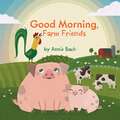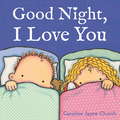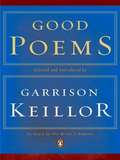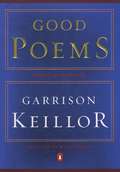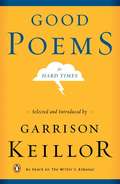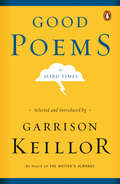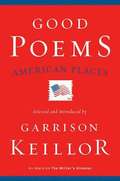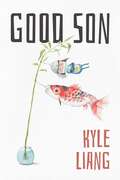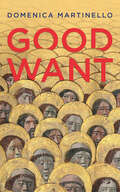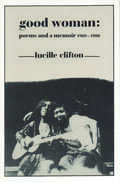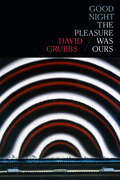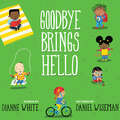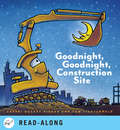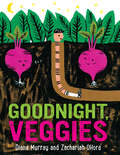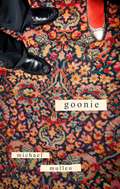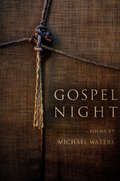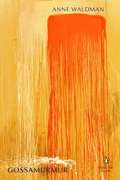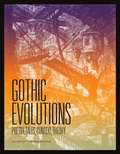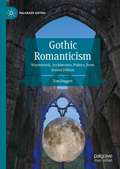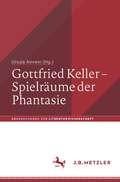- Table View
- List View
Good Morning, Farm Friends
by Annie BachRise and shine! This charming board book about farm animals waking up and getting ready for a busy day is perfect for the youngest readers.As the sun rises, the animals on a bustling farm get ready for the day. Pigs roll around in the mud, cows wait at the milking stall, and horses run through pastures. But is everyone awake? The rooster will make sure of it! The fun rhyming text and colorful illustrations in this delightful book will help little ones start their day off just right.
Good Night, Dude Perfect
by Dude Perfect Kristin HilbertGet ready for bed--Dude Perfect style! Join your favorite sports comedy YouTubers for a fun way to say good night to trick shots, friendly challenges, hilarious characters, world records, and all your favorite things in the DP universe in this entertaining, rhyming bedtime book.Say good night to a busy day along with Dude Perfect in this engaging picture book. Even the most active child will want to wind down with the Dudes before heading off to a dreamland full of bottle flips and Overtime shows.Good Night, Dude Perfectis for children 4 to 8 and Dude Perfect fans of all ages;lets readers say good night to Cody, Garrett, Cory, Coby, Ty, and Panda;includes nods to memorable Dude Perfect history, tricks, and games;features fun rhymes; andis the perfect gift for birthdays, Christmas, and Father's Day.Tonight, take a break with Dude Perfect as you look forward to more action tomorrow. Pound it, noggin, see yaaa-wn!
Good Night, I Love You
by Caroline Jayne ChurchGet ready for bed with this delightful, cosy bedtime rhyme.It's time for bed, so let's get ready.Bring your bunny. Bring your teddy.A charming bedtime rhyme for little ones, perfect for reading aloud. Snuggle up, wind down, and follow the bedtime routine until the last 'I love you, good night'.By Caroline Jayne Church, multi-award winning author and illustrator, with over 6.5 million books sold worldwide.
Good Poems
by Various Keillor Garrison EditorEvery day people tune in to The Writer's Almanac on public radio and hear Garrison Keillor read them a poem. And here, for the first time, is an anthology of poems from the show, chosen by the narrator for their wit, their frankness, their passion, their "utter clarity in the face of everything else a person has to deal with at 7 a. m. " The title Good Poems comes from common literary parlance. For writers, it's enough to refer to somebody having written a good poem. Somebody else can worry about greatness. Mary Oliver's "Wild Geese" is a good poem, and so is James Wright's "A Blessing. " Regular people love those poems. People read them aloud at weddings, people send them by e-mail. Good Poems includes poems about lovers, children, failure, everyday life, death, and transcendance. It features the work of classic poets, such as Emily Dickinson, Walt Whitman, and Robert Frost, as well as the work of contemporary greats such as Howard Nemerov, Charles Bukowski, Donald Hall, Billy Collins, Robert Bly, and Sharon Olds. It's a book of poems for anybody who loves poetry whether they know it or not. .
Good Poems
by Garrison KeillorDozens of American and English poems, selected and introduced by Keillor.
Good Poems for Hard Times
by Garrison KeillorForget what you learned about poetry in school (that it's complex, opaque, a problem to be solved in 1,500 words due tomorrow). Poetry is the last preserve of honest speech and the outspoken heart. It holds the cadence of common life. It has a passion for truth and justice and liberty-the spirit that has kept the American porch light lit through dark ages of history. And the meaning of poetry is to give courage.
Good Poems for Hard Times
by Various Garrison KeillorChosen by Garison Keillor for his readings on public radio's The Writer's Almanac, the 185 poems in this follow-up to his acclaimed anthology Good Poems are perfect for our troubled times. Here, readers will find solace in works that are bracing and courageous, organized into such resonant headings as "Such As It Is More or Less" and "Let It Spill." From William Shakespeare and Walt Whitman to R. S. Gwynn and Jennifer Michael Hecht, the voices gathered in this collection will be more than welcome to those who've been struck by bad news, who are burdened by stress, or who simply appreciate the power of good poetry.
Good Poems, American Places
by Various Garrison KeillorP> Another wonderful poetry anthology from Garrison Keillor-rooted in the American landscape. Greatness comes in many forms, and as Garrison Keillor demonstrates daily on The Writer's Almanac, the most affecting poems in the canon are in plain English. Third in Keillor's series of anthologies, Good Poems, American Places brings together poems that celebrate the geography and culture that bind us together as a nation. Think of these poems as postcards from the road, by poets who've gotten carried away by a particular place-a town in Kansas, a kitchen window in Nantucket, a Manhattan street, a farm in western Minnesota. Featuring famous poets and brash unknowns alike, the verses in this exhilarating collection prove that the heart can be exalted anywhere in America.
Good Son
by Kyle LiangKyle Liang's full-length poetry collection, Good Son, encapsulates the "American-born Chinese" diaspora in 70 stunning, heart-rending pages. At its core bleeds a life deeply troubled by Western centrism and not-so-casual racism. Liang details both suppression and acceptance through the lens of a speaker born to immigrant parents in a deft collection that refuses to separate identities into boxes. Explorations of informed consent, the rash of anti-Asian hate crimes that followed COVID-19, and the mockery of speech and accents and social issues intertwine with staggering prose in poems about resilience-and love. What the speaker longs for most is for their heart "to be greedy again." In these pages is the embodiment of that fathoms-deep exquisite longing for self.
Good Sports: Rhymes About Running, Jumping, Throwing, and More
by Jack PrelutskyBy our nation's first Children's Poet Laureate If you like running, jumping, throwing and having fun playing games, then this book is meant for you! Jack Pretlusky celebrates the joy of participating in sports boys and girls play. Whether it's baseball or soccer; gymnastics or karate, winning or losing, excelling or just being a happy klutz, these short rhymes sing out in praise of winter games, summer games, and all-year-round games.
Good Want
by Domenica MartinelloWhat if poetry and prayer are the same: intimate and inconclusive, hopeful and useless, a private communion that hooks you to the thrashing, imperfect world?Good Want entertains the notion that perhaps virtue is a myth that’s outgrown its uses. Exploring the value and shame ascribed to our desires both silly and serious – artistic, superficial, spiritual, relational – these poems grapple with deeply rooted questions: How can there be a relationship between goodness and godliness, if god is a character with shifting allegiances and priorities? Is clarity worth the pain of redefining your experience of the world? Is privacy the same as secrecy the same as deceit? Each caveat becomes a prayer, ritual, invocation, dream, or confession, requiring a blind faith that feels increasingly more impossible to sustain. Good Want looks inward, at once both sincere and tongue-in-cheek, to confront the hum of class and intergenerational trauma. Playing with and deconstructing received notions of ‘good,’ ‘bad,’ and ‘god,’ these poems open up a series of further possibilities: empathy for difficult people, acceptance of our difficult selves, and joy in every difficult thing."These are lush, provocative poems that luxuriate in unexpected detail while examining how economic precarity shapes both shame and desire. Firmly rooted in the working class, Martinello explores the hunger we inherit from our ancestors, what it means to indulge from a position of bottomless want, and to 'Waste not your wanting.' With impressive range, a sense of humor, and entrancing musicality, Good Want is a celebration of the gluttony of girlhood, the paradoxes of faith, and everyday pleasures of a “small, specific life.” – Cassidy McFadzean, author of Crying Dress"Good Want is a baroque painting of Dutch aristocracy, but all the subjects’ garments are secretly from Walmart. I mean this in the best way. Each poem cracks me open and out shines a never-before-seen shade of light." – Shy Watson, author of Cheap Yellow"Sometimes the confessor reckons with the confessional. In Good Want, it's a wracking and lucky sometimes, full of piss and vinegar, and one that finds Domenica Martinello performing the wonderment, the depth and push and pull, between what there is to reveal and what each revelation ruptures or binds. Happily, sadly, the poet scours a life lived and unearths inheritances, burdens, and selves destined for and not for the telling. And tells them brilliantly as she pleases." – D.M. Bradford, author of Bottom Rail on Top
Good Woman: Poems and a Memoir 1969-1980 (American Poets Continuum #14)
by Lucille CliftonFinalist for the 1988 Pulitzer Prize for PoetryA landmark collection by National Book Award-winning poet Lucille Clifton, Good Woman: Poems and a Memoir 1969-1980 includes the four poetry collections that launched Clifton’s career—Good Times, Good News About the Earth, An Ordinary Woman, and Two-Headed Woman—as well as her haunting prose memoir, Generations. In honor of the 30th anniversary of Lucille Clifton's Pulitzer Prize-nominated poetry collection and memoir, Good Woman is now available for the first time as a deluxe eBook edition. Enhanced with previously unpublished photographs from the Lucille Clifton Estate and a special foreword by Aracelis Girmay, this eBook is a must-have for longtime Clifton fans and newcomers alike.
Good night the pleasure was ours
by David GrubbsWith Good night the pleasure was ours, David Grubbs melts down and recasts three decades of playing music on tour into a book-length poem, bringing to a close the trilogy that includes Now that the audience is assembled and The Voice in the Headphones. In Good night the pleasure was ours, the world outside the tour filters in with eccentric sparseness. From teenage punk bands to ensembles without fixed membership, and from solo performance to a group augmented by digital avatars, Grubbs presents touring as a series of daily dislocations that provides an education distinctly its own. These musicians’ job is to play that evening’s gig—whether to enthusiastic, hostile, or apathetic audiences—and then to do it again the next day. And yet, over the course of the book’s multidecade arc, Grubbs depicts music making as an irreversible process—one reason for loving it so.
Goodbye Brings Hello: A Book of Firsts
by Daniel Wiseman Dianne WhiteLike Bernie Waber's COURAGE and Davis' KINDERGARTEN ROCKS!, this inspiring, vibrantly illustrated gift book is perfect for celebrating life's milestones, both great and small—especially that first day of kindergarten.There are many ways of letting go. With each goodbye, a new hello. From being pushed on a swing to learning how to pump your legs yourself, from riding a beloved trike to mastering your first bike ride, from leaving the comforts of home behind to venturing forth on that first day of school, milestones are exciting but hard. They mean having to say goodbye to one moment in order to welcome the next. Honest and uplifting, this cheerfully illustrated ode to change gently empowers readers to brave life's milestones, both large and small.
Goodnight Racism
by Ibram X. KendiNational Book Award–winning and New York Times bestselling author Ibram X. Kendi (How to Be an Antiracist, Antiracist Baby) returns with a new picture book that serves as a modern bedtime classic.As children all over the world get ready for bed, the moon watches over them. The moon knows that when we sleep, we dream. And when we dream, we imagine what is possible and what the world can be. With dynamic, imaginative art and poetic prose, Goodnight Racism delivers important messages about antiracism, justice, and equality in an easy-to-read format that empowers readers both big and small. Goodnight Racism gives children the language to dream of a better world and is the perfect book to add to their social justice toolkit.
Goodnight, Goodnight Construction Site: (construction Books For Kids, Books With Sound For Toddlers, Children's Truck Books, Read Aloud Books) (Goodnight, Goodnight, Construc)
by Sherri Duskey RinkerThe #1 New York Times bestselling children's book"A standout picture book, especially for those who like wheels with their dreams." —Booklist, starred reviewAs the sun sets behind the big construction site, all the hardworking trucks get ready to say goodnight. One by one, Crane Truck, Cement Mixer, Dump Truck, Bulldozer, and Excavator finish their work and lie down to rest—so they'll be ready for another day of rough and tough construction play!• Author Sherri Duskey Rinker's sweet rhyming text soothes little ones into a peaceful rest• Full of irresistible artwork by illustrator Tom Lichtenheld• Goodnight, Goodnight, Construction Site is the perfect read-aloudThis popular, timeless nighttime story continues to delight families everywhere!• Ideal for children ages 3 to 5 years old• Great for young construction fans• This adorable hardcover bedtime book is a go-to gift for any occasion
Goodnight, Veggies
by Diana Murray★ "The childlike approach, appealing art, and relatable worm character...connect story and audience." —The Horn Book, STARRED reviewEvery veggie needs their shut-eye in this bedtime book that celebrates community, the joys of a small garden, and the importance of taking care of ourselves. Illustrated by New York Times bestselling artist Zachariah OHora, Goodnight Veggies is perfect for fans of the Llama Llama series and will keep emerging readers engaged with adorable illustrations, especially while children are at home exploring backyards, plant pots, and balcony garden patches.As the sun begins to set, the tomatoes are tuckered out, the cucumbers are calm, and the beets are simply beat.But what’s got them all so exhausted?Celebrate the turning of day to night in this perfect bedtime ritual for plants—and humans—everywhere!
Goonie
by Michael Mullen'Goonie is a boisterously brilliant collection that sings like the mother of all songbirds' Michael Pedersen, author of The Cat Prince'An absolute beauty of a book by an absolute beauty of a writer. Goonie is an essential tribute to life and fight and love and language' Hollie McNish, author of Lobster'I've enjoyed Michael Mullen's poems since the moment I first encountered them. He is brave and funny, Glasgow-gallus and compassionate . . . Goonie announces a real new talent' Kathleen Jamie, author and former Scottish Makar'This is gorgeous, maximalist poetry, playful and glittering but rooted in anger and honesty, a sensual Technicolor shot of Scots joy. I will be raving about this for years' Kirstin Innes, author of Scabby Queen'These poems are tender weapons that will smash through any apathy that still remains towards the Scots language, they are pulsing with humour and wit but the reverence that Mullen gives to every day moments, characters and life make me realise there is always more to learn, more to see, deeper to go. I have no doubt Goonie is a new Scottish classic' Leyla Josephine, Forward Prize-winning poetGoonie is the raw and joyful debut collection from award-winning Scottish poet and spoken word artist Michael Mullen. Whether exploring queerness through fierce lyrical poetry or celebrating Mullen's beloved Scotland through vernacular vignettes, Goonie's main preoccupation is with how we form community around us and how community, in turn, forms us. Many of the themes are encapsulated by the title poem as the narrator readies themself to take the stage and perform for their older relatives wearing an old goonie (a nightdress): 'Ma aunt raising her vodka Iron-Bru, a tumblr ae noxious flame, a toast / tae me, n ma frilly jig. Awk A jist lettum wear witever he wahnts tae wear.'In Goonie, the oral tradition of Scots combines with whip-sharp Glaswegian humour to bring alive in language and form the full spectrum of human connection: working class friends gathering round a fire, a living room ceilidh, an chat in the hairdresser's chair, a queer awakening. These poems show the power of acceptance, togetherness and creative expression.All aspects of Mullen's life as a performer, a poet, a queer son, a Scot, a working-class boy, come together on the page to form a collection that casts a sceptical eye on identity whilst also championing it. Ultimately, Goonie address the ties that bind: it is a testament to how love - of ourselves, our heritage, our landscape, each other - transforms everything.
Gospel Hymn Book: 795 Hymns
by John Ritchie Ltd.This is a non-denominational words-only collection of 795 hymns designated as "Gospel hymns." You'll find 33 hymns by the blind hymn writer Fanny J. Crosby, 39 hymns by the hymn writer Albert Midlane and 10 hymns of Charles Wesley. All hymns are produced in poetry style. The book is organized into 15 sections with hymns in each section in alphabetical order. Sections of the book include Adoration and Praise, Gospel, Entreaty and Warning, Testimony and Assurance, The Christian Life, Consecration, Prayer, The Scriptures, Resurrection of Christ, The Lord's Coming, and Heaven. The book closes with a complete alphabetical index of all hymns. Hymn titles have no punctuation but names and pronouns referring to God, Jesus, and the Holy Spirit are capitalized. If you keep this in mind, you should be able to search by name for a hymn you want to sing. With this collection on your paperless Braille device (including the free NLS eReader), you can lead or participate in a hymn sing. In the DAISY format, each section is at level 1 and each hymn is at level 2. As a result, Bookshare software will commence the BRF edition with a full table of contents followed by the text of the hymnal. For other hymn collections on Bookshare see also The United Methodist Hymnal, Glory to God (Presbyterian), Evangelical Lutheran Worship, and Lutheran Servicebook: Psalms and Hymns. For texts of cantatas by Johann Sebastian Bach, see The Church Cantatas of J. S. Bach by Alec Robinson (with commentary), and Johann Sebastian Bach: The Complete Cantatas in German-English translations by Richard Stokes.
Gospel Night
by Michael Waters"Waters's elegant language suggests that there is grace to be found in facing and speaking of our sorrows. . . . His use of humor creates a tension between the profane and the sublime."--Arts & Letters Among the survivors of the DonnerParty--idiom's black sense of humor--Who developed a secret taste for fleshFlaked between the fluted bones of the wrist? In his tenth poetry collection, Michael Waters tackles the dual (and dueling) natures of our humanity: sin and transgression, isolation and atrocity, love and darkness, and the desire for a language that can illuminate such ordinary yet disturbing spaces.
Gospel Night (American Poets Continuum #129)
by Michael Waters"Waters's elegant language suggests that there is grace to be found in facing and speaking of our sorrows. . . . His use of humor creates a tension between the profane and the sublime."—Arts & Letters Among the survivors of the DonnerParty—idiom's black sense of humor—Who developed a secret taste for fleshFlaked between the fluted bones of the wrist? In his tenth poetry collection, Michael Waters tackles the dual (and dueling) natures of our humanity: sin and transgression, isolation and atrocity, love and darkness, and the desire for a language that can illuminate such ordinary yet disturbing spaces.
Gossamurmur
by Anne WaldmanA fascinating new work from an internationally renowned poet Acclaimed for her visionary, incantatory verse and her experimental ethos, Anne Waldman's newest book-length poem is an allegory of a radical spirit in lockdown, dominated by "Deciders" and "Imposters" who threaten the future of poetry and its archive. A doppelganger nightmare ensues: the imposter "Anne" is a succubus, and the original Anne has to break free from a metaphorical castle of torture and psychological domination. There are travels through Vedic cosmology and ancient Japan before resolution on a treeless tundra, where fragile life forms struggle to survive. Waldman's oracular poem is a witty meditation on identity theft and a searing plea for the primacy of imagination and for collective sanity in our provocative yet precarious time. .
Gothic Evolutions: Poetry, Tales, Context, Theory
by Corinna WagnerThe texts in this unique collection range from the Gothic Revival of the late eighteenth century through to the late Victorian gothic, and from the poetry of Wordsworth and Coleridge to the short fiction of H.G. Wells and Henry James. Genres represented include medievalist poetry, psychological thrillers, dark political dystopias, sinister tales of social corruption, and popular ghost tales.
Gothic Romanticism: Wordsworth, Architecture, Politics, Form (Palgrave Gothic)
by Tom DuggettGothic Romanticism: Wordsworth, Architecture, Politics, Form offers a revisionist account of both Wordsworth and the politics of antiquarianism in the late eighteenth and early nineteenth centuries. As a historically-driven study that develops a significant critique and revision of genre- and theory-based approaches to the Gothic, it covers many key works by Wordsworth and his fellow “Lake Poets” Samuel Taylor Coleridge and Robert Southey. The second edition incorporates new materials that develop the argument in new directions opened up by changes in the field over the last decade. The book also provides a sustained reflection upon Romantic conservatism, including the political thought and lasting influence of Edmund Burke. New material places the book in wider and longer context of the political and historical forms seen developing in Wordsworth, and proposes Gothic Romanticism as the alternative line of cultural development to Victorian Medievalism.
Gottfried Keller – Spielräume der Phantasie (Abhandlungen zur Literaturwissenschaft)
by Ursula AmreinDie in diesem Band versammelten Beiträge zeigen Keller als einzigartigen Erzähler, richten den Blick auf Texte aus dem Nachlass, gehen seinen Träumen und Phantasien nach, verfolgen seine Spuren als Maler, diskutieren seine Theaterprojekte, erläutern seine Beziehung zur Musik und vergegenwärtigen ihn als Politiker. Lektüren, die diesen unterschiedlichen Zusammenhängen Rechnung tragen, bringen pointiert neue Erkenntnisse in die Auseinandersetzung mit Gottfried Keller und seinem Werk ein.
